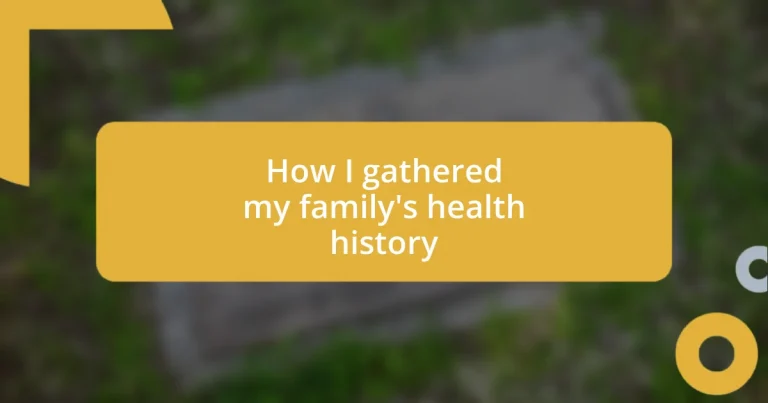Key takeaways:
- Understanding family health history can reveal hereditary risks, encouraging proactive health management and informed lifestyle choices.
- Engaging in open conversations with relatives and using technology can enhance the collection and organization of health data.
- Sharing gathered health information with healthcare providers fosters personalized care and informed discussions about preventative measures.
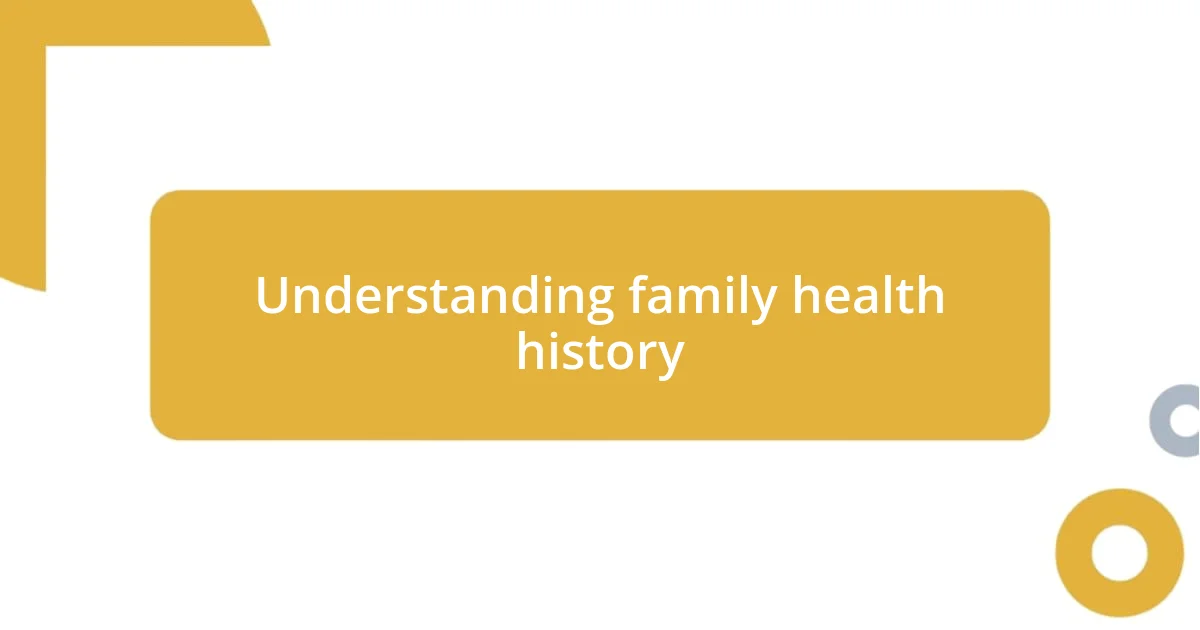
Understanding family health history
Understanding family health history is like unearthing a treasure chest of information that can guide your health decisions. I remember when I first started piecing together mine; it felt like detective work, digging through old family documents and asking relatives about their experiences. Have you ever felt that thrill of discovery when connecting past health incidents to your own life?
As I gathered this information, I was struck by how patterns emerged. For instance, my grandmother’s struggles with heart issues made me realize I might need to monitor my own heart health more closely. It raised questions: What if I hadn’t investigated? What other health risks might I have unknowingly inherited? These realizations transformed the way I view regular check-ups and my lifestyle choices.
Moreover, understanding family health history can foster a deeper connection with loved ones. Discussing these matters often leads to sharing memories and stories, which can be both enlightening and emotional. Have you considered how these conversations could not only inform your health but also strengthen family bonds? It’s a journey worth embarking on for both personal health and relational intimacy.
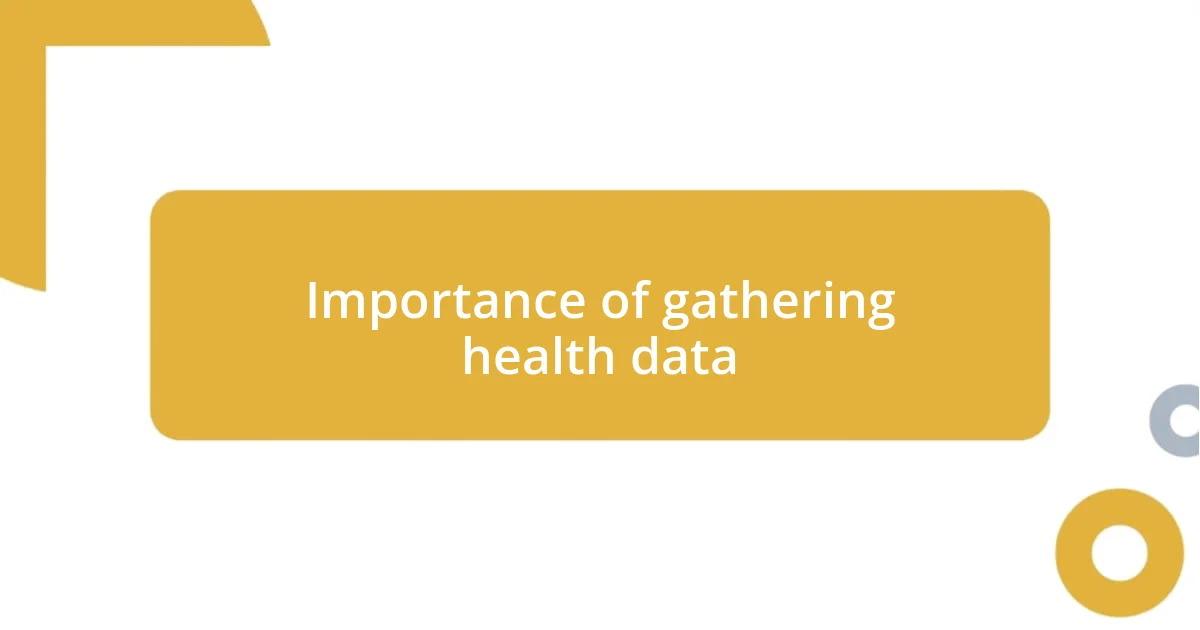
Importance of gathering health data
Gathering health data is not just an exercise; it can genuinely shape our understanding of our personal health narratives. I recall sitting down with my mom one afternoon, going through medical records and discussing her childhood illnesses. It was enlightening to learn how her experiences could influence my health journey. By identifying hereditary conditions, I felt empowered to take preventive measures and make informed health decisions.
Here are a few reasons why gathering family health data is crucial:
– Identifies Risk Factors: Knowing your family’s health history helps pinpoint hereditary risks, allowing for proactive health management.
– Informs Preventative Care: Armed with this knowledge, you can take preventive measures, like lifestyle changes or regular screenings tailored to your family’s health trends.
– Enhances Communication with Healthcare Providers: Sharing detailed family health history with doctors can lead to more personalized care and potential early interventions.
– Promotes Family Health Awareness: It encourages all family members to be more mindful of their health, fostering a culture of wellness and support.
These insights profoundly expanded my perspective on health, highlighting not just the individual but the collective responsibility we share toward our well-being.
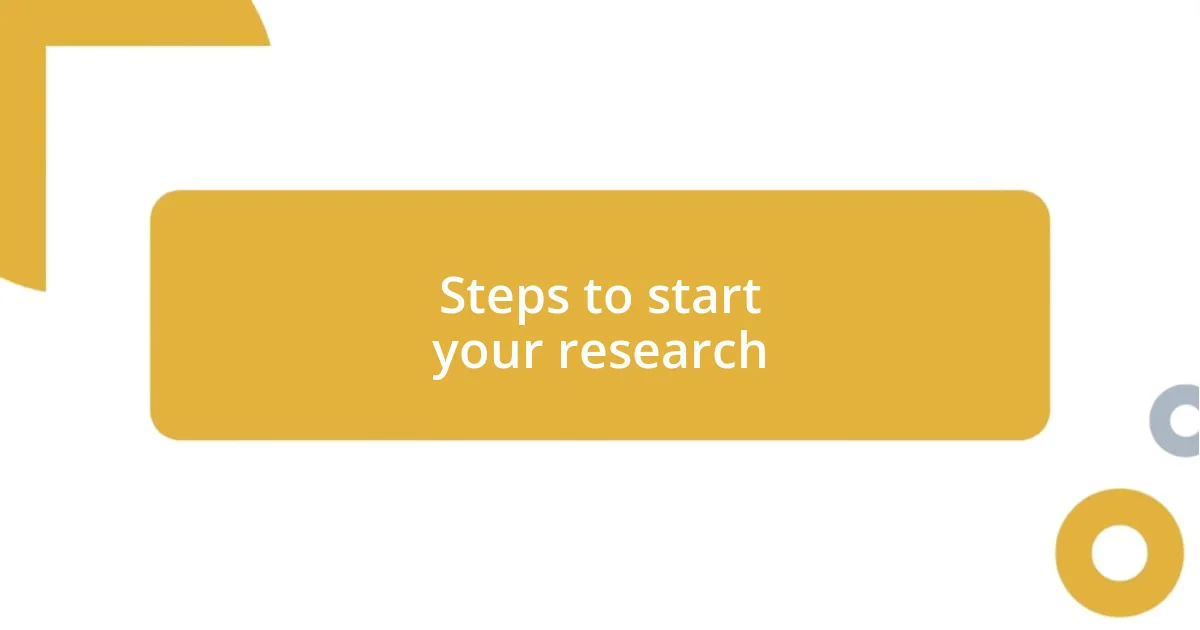
Steps to start your research
Starting your research on family health history can feel overwhelming, but breaking it down into manageable steps simplifies the process. Begin by making a list of immediate family members—parents, siblings, and grandparents. I found it helpful to create a simple chart that included names, birth dates, and known health conditions. This straightforward approach acts as a great starting point for more detailed discussions.
Next, engage with your relatives; their stories can unveil health patterns that often go unnoticed. I remember chatting with my aunt over coffee about our family’s history, which revealed my great-grandfather had diabetes. This conversation illuminated my risk of developing the condition and prompted further discussions with my doctor about proactive measures I should consider.
Lastly, don’t forget to gather medical records if you can. Online patient portals or physical clinics sometimes allow access to historical health information. When I accessed my family’s medical records, I discovered conditions that hadn’t been discussed in family gatherings but were crucial to my understanding of our health narrative. This step not only solidified my research but also added an element of authenticity to what was previously just hearsay.
| Step | Description |
|---|---|
| Create a Family Tree | List immediate family members with health details. |
| Engage in Conversations | Talk with relatives to uncover stories and health patterns. |
| Gather Medical Records | Access historical health records for solid information. |
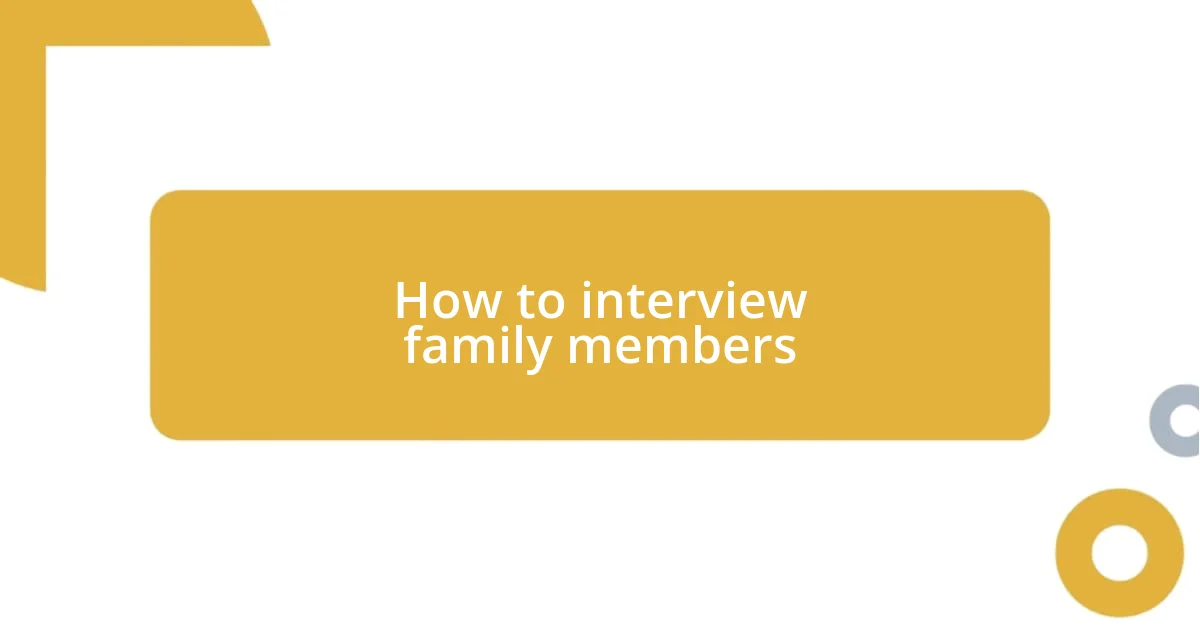
How to interview family members
When interviewing family members about their health history, it’s important to create a comfortable environment. I’ve found that choosing a relaxed setting, like a cozy living room or a favorite café, helps ease any tension. Have you ever noticed how a warm cup of tea can spark deeper conversations? It does wonders for opening up discussions on sensitive topics.
To guide the conversation, I recommend preparing a few open-ended questions in advance. For example, asking “What health issues have you experienced over the years?” encourages more than just a simple yes or no. I remember asking my uncle about his experiences with heart disease, and his detailed stories not only revealed critical information but also allowed an emotional connection to form—we shared laughs and memories amidst serious topics.
Finally, make sure to actively listen and express genuine interest in their stories. Show empathy for their experiences, as this can lead to richer insights. I once sat with my grandmother, who spoke of her struggles with arthritis. By validating her feelings, I not only learned about her condition but also felt a deeper appreciation for her resilience. How often do we take the time to hear and understand our loved ones fully? This process not only enriches the data you collect, but it strengthens family bonds as well.
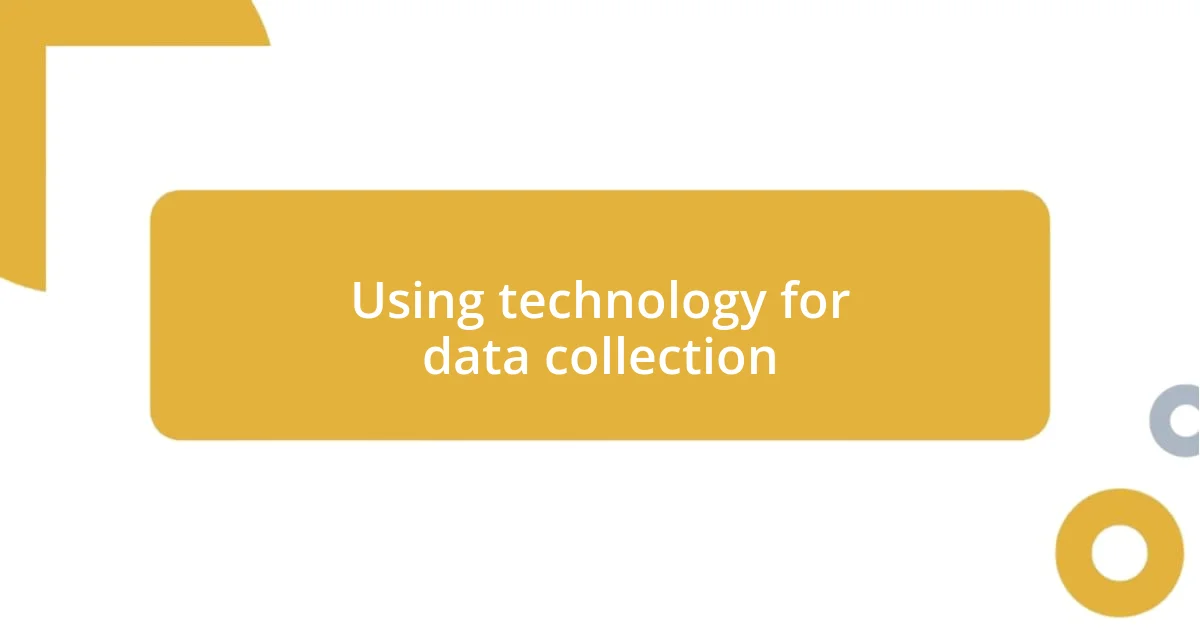
Using technology for data collection
Using technology to gather family health history can make the process smoother and more efficient. I personally found apps designed for health tracking so useful in recording details from family conversations. For instance, while discussing our family’s health during a family reunion, I jotted down notes directly into my phone. Having that digital record ensured I wouldn’t forget crucial insights later, making the information accessible at my fingertips.
Another method I embraced was utilizing online genealogy websites that offer health record integrations. I remember spending an evening sifting through long-lost family documents, discovering conditions that my relatives had faced. These platforms not only connected me with distant relatives who might share additional information but also helped me visualize our family tree in a more interactive way. Isn’t it fascinating how technology makes this once tedious task feel almost like an adventure?
Moreover, consider keeping a shared online document with your family members. This can serve as a collaborative space where everyone can add their health information or experiences over time. I created one for my relatives, and I was amazed at how quickly it filled up with stories and insights. It made me wonder: how often do we overlook the potential of collective knowledge? Allowing everyone to contribute transformed our health history gathering into a community effort, deepening our connections while ensuring we preserved our family legacy effectively.
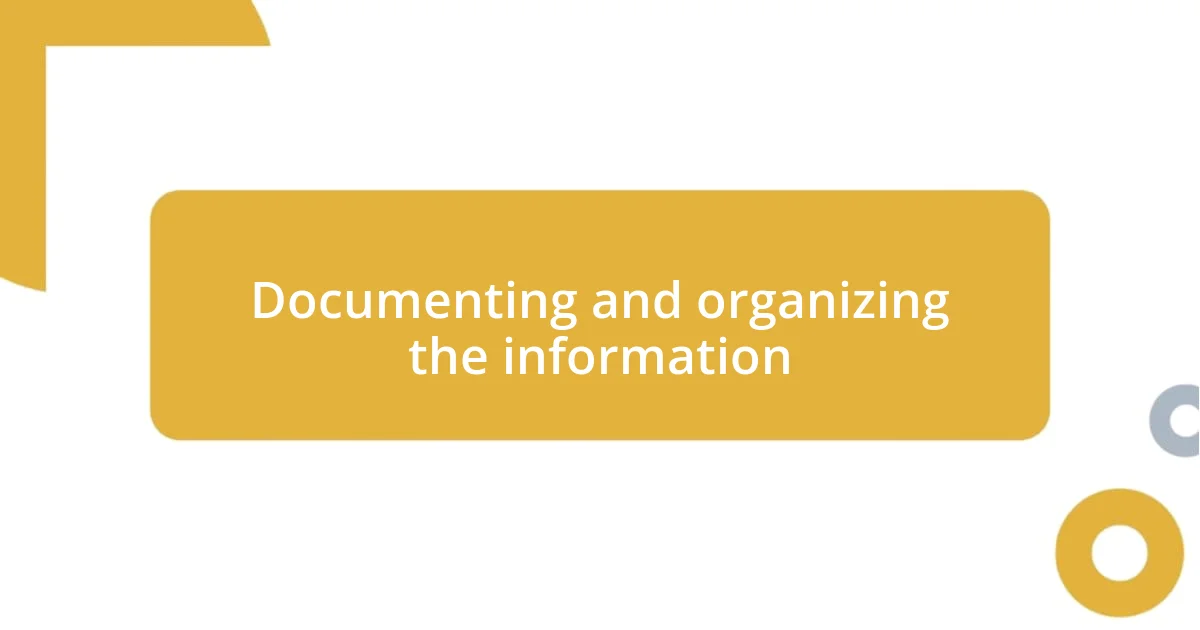
Documenting and organizing the information
To truly capture and organize the health information I gathered, I turned to a simple yet effective method: creating a family health history chart. It’s like building a puzzle, where each piece represents a different family member’s experiences. As I filled in details—from my father’s battle with diabetes to my aunt’s struggle with breast cancer—it struck me how valuable this visual representation was. Have you ever looked at a chart and suddenly felt the weight of shared experiences? It made me acutely aware of our family’s health narrative.
I found it particularly beneficial to categorize the information chronologically and by health condition. This organization helped me see patterns and possible hereditary risks. While compiling this data, I uncovered that several relatives had dealt with similar ailments, sparking conversations about preventive measures. It was almost surreal to realize how interconnected our health journeys were. How often do we examine our family’s history through such a lens? This process not only organized the information but also empowered me to approach my own health decisions more thoughtfully.
Additionally, I made it a point to include notes on lifestyle factors, such as diet and exercise habits. This added layer offered a more rounded view of our health history. I remember discussing our family’s penchant for hearty meals during holidays, and it dawned on me—these traditions, while comforting, also influenced our health outcomes. By integrating these details, I could appreciate not just the medical context but the emotional ties behind our choices. It made me wonder: how often do we pause to reflect on the connection between our family’s habits and our health? Documenting all this made our stories richer and emphasized the importance of mindfulness towards our collective well-being.
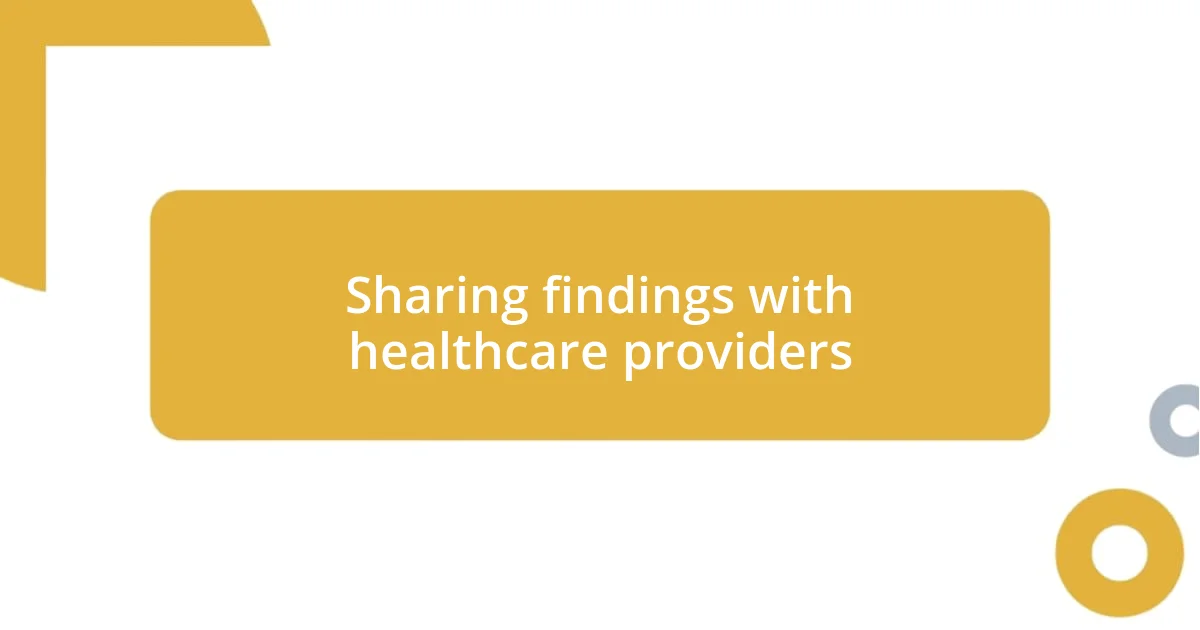
Sharing findings with healthcare providers
Once I gathered the family health history, the next logical step was to share it with our healthcare providers. I distinctly remember sitting in my doctor’s office, armed with my carefully compiled notes, and the look of surprise on my physician’s face as I presented our family’s health patterns. It felt empowering to know that those details could aid in tailoring my health management; it raised the question in my mind: how often do we consider our family’s narrative when making personal health choices?
During my discussions with my healthcare team, I noticed how they appreciated having a comprehensive picture of my family’s health. They used the information to propose screenings that seemed relevant based on our history, making the entire experience feel collaborative. I realized that sharing these insights not only fostered a deeper connection with my providers but also opened the door to more personalized care. Have you ever felt that energy shift when you share something so impactful with someone who genuinely listens?
In my experience, sharing findings with healthcare providers allowed for a more enriching dialogue about my health. Once, I mentioned my grandmother’s history of heart disease, which prompted my doctor to suggest a proactive approach to monitoring my own cardiovascular health. That simple conversation reminded me that every shared detail can lead to better outcomes. Isn’t it fascinating how our past can influence our future, and how being open about our history can help guide us toward better health decisions?












